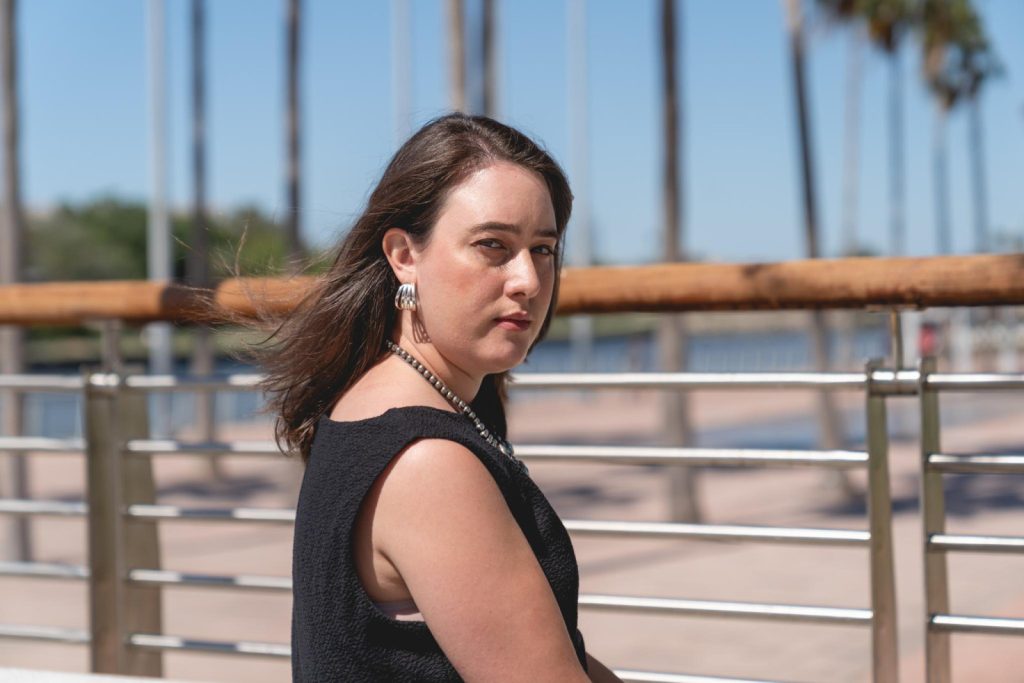
[Natalie Scenters-Zapico, photo by John Markadakis]
Before the pandemic, I made one of many trips from LAX to MEX with my husband. I have family in Long Beach, so it’s easy to catch a flight to Mexico City after visiting them. On my way home from one of these trips, I was struck by how fierce border protection through airline travel had become.
As many of us have experienced, agents blare over loudspeakers not to use our phones, they corral us into tinier and tinier buses, then to large cordoned off rooms filled with machines to process our documents and take our photos, until finally we wait for a receipt of judgement that tells us if we can go through the glass gates or if we must stop and speak with an agent. I am always anxious during these encounters, but usually because I am traveling with someone who is seen as “suspicious” by the state. My whole life my loved ones have been seen as a threat to the state in some capacity, and I have always been placed in the room just outside to wait and see if Homeland Security will leave me stranded in this country without anyone I love in it. It’s a peculiar and common position many are put in. On the one hand, it is a position of the privileged to have citizenship, on the other hand it puts one a stone’s throw from having everything that gives your life meaning in a country (mothers, fathers, siblings, partners) taken from you.
My husband started the paperwork to become a citizen the week Trump was elected to office. I wish I could say it was because he wanted this, but the truth is more like I was terrified of losing him. When he finally went to a courthouse in Lincoln, Nebraska, to swear allegiance to the country that actively wanted him deported for over a decade, let’s just say it was emotional. Courthouse employees handed out tiny American flags to each new citizen. His class of applicants, if you will, was the first to be welcomed to the country by a DVD of Donald J. Trump. I wish I could tell you I remember what Trump said in that video, but I do not. I only remember being terrified that something could go wrong at any moment. When you grow up dictated by agents from Homeland Security and CBP you know all too well that what they say is “routine” can quickly turn into a routine to destroy your life. As my husband raised his right hand to say the oath, he looked so far away. The whole process felt terribly painful to me. But what was my pain compared to his? After the ceremony we both left the courthouse directly to teach at the university a few blocks away. No time off for a US citizen.
Perhaps this is why on a return flight from MEX to LAX I was in shock when I was told that I had to go speak with an agent, and my husband would be the one waiting for me on the other side of the immigration barrier. It was a complete reversal of roles. Though I am a citizen of this country from birth, I was nervous. What could they possibly want from me? As my poem “Present this receipt to CBP” details, it was to present me with a sales-pitch for Global Entry, in which I surrender my biometric information so that I can further use the privilege of my citizenship to stand apart from my family. When I see people speed by me at the airport because they have biometric visas like Global Entry or CLEAR, I can’t help but see the cosmopolitan elite using its giant shoe to step on those who don’t have such privileges. In that moment though, nodding and smiling through the agent’s pitch, I realized that I was being asked to make a choice: Be a part of the cosmopolitan elite or stand harassed like the rest of the crowd.
I have yet to apply for Global Entry. Truthfully, I refuse to do so. I’ll wait in line with the masses. I’m no foreigner to waiting in lines having grown up crossing the US-Mexico border from El Paso to Juárez and back frequently. We are in an era that asks us to document and surrender every part of ourselves. Perhaps a small act of radical rebellion can be to say: No.
Natalie Scenters-Zapico‘s poems “Present This Receipt to CBP” and “Agent” appeared in NER 42.3. She is the author of Lima: Limón (Copper Canyon Press 2019) and The Verging Cities (Center for Literary Publishing, 2015). Scenters-Zapico has won Yale University’s Windham Campbell Prize, a Lannan Literary Fellowship, a Ruth Lilly and Dorothy Sargent Rosenberg Fellowship from the Poetry Foundation, and a CantoMundo fellowship. She currently teaches Creative Writing at the University of South Florida.